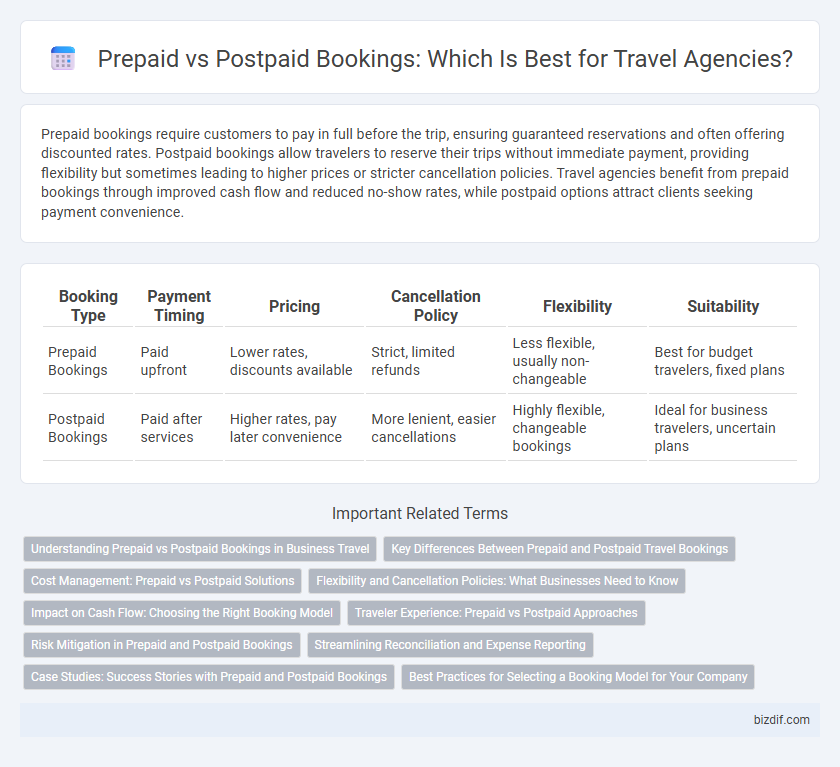Prepaid bookings require customers to pay in full before the trip, ensuring guaranteed reservations and often offering discounted rates. Postpaid bookings allow travelers to reserve their trips without immediate payment, providing flexibility but sometimes leading to higher prices or stricter cancellation policies. Travel agencies benefit from prepaid bookings through improved cash flow and reduced no-show rates, while postpaid options attract clients seeking payment convenience.
Table of Comparison
| Booking Type | Payment Timing | Pricing | Cancellation Policy | Flexibility | Suitability |
|---|---|---|---|---|---|
| Prepaid Bookings | Paid upfront | Lower rates, discounts available | Strict, limited refunds | Less flexible, usually non-changeable | Best for budget travelers, fixed plans |
| Postpaid Bookings | Paid after services | Higher rates, pay later convenience | More lenient, easier cancellations | Highly flexible, changeable bookings | Ideal for business travelers, uncertain plans |
Understanding Prepaid vs Postpaid Bookings in Business Travel
Prepaid bookings require travelers or companies to pay in full before the trip, offering budget control and often securing better rates or discounts in business travel. Postpaid bookings allow payment after services are rendered, providing flexibility but potentially higher administrative costs and risk of non-payment. Understanding the balance between prepaid and postpaid options helps travel agencies optimize cash flow management and cater to diverse corporate client preferences.
Key Differences Between Prepaid and Postpaid Travel Bookings
Prepaid travel bookings require full payment at the time of reservation, ensuring guaranteed availability and often discounted rates, while postpaid bookings allow travelers to pay later, offering greater flexibility but potential price fluctuations and limited cancellations. Prepaid options typically have stricter cancellation policies, whereas postpaid bookings may provide optional payment plans or hold reservations temporarily without upfront costs. Understanding these differences helps travelers balance cost savings with payment convenience when planning trips through travel agencies.
Cost Management: Prepaid vs Postpaid Solutions
Prepaid bookings enable travel agencies to manage costs more effectively by securing payments upfront, reducing the risk of cancellations and financial losses. Postpaid solutions offer flexibility for clients but can lead to delayed cash flow and increased administrative expenses due to follow-ups and potential defaults. Optimizing between prepaid and postpaid strategies helps agencies balance immediate revenue with client convenience, enhancing overall financial stability.
Flexibility and Cancellation Policies: What Businesses Need to Know
Prepaid bookings typically offer lower rates but come with stricter cancellation policies, limiting flexibility for travelers and businesses alike. Postpaid bookings provide greater flexibility, allowing adjustments or cancellations closer to the travel date without significant penalties, which is vital for dynamic business schedules. Understanding the balance between cost savings and cancellation terms helps travel agencies tailor booking options to client needs, optimizing satisfaction and operational efficiency.
Impact on Cash Flow: Choosing the Right Booking Model
Prepaid bookings improve cash flow by securing funds upfront, reducing financial risk and enabling better budget management for travel agencies. Postpaid bookings delay revenue collection, potentially straining cash flow but offering greater flexibility to customers. Selecting the optimal booking model depends on aligning payment timing with the agency's operational cash flow needs and client preferences.
Traveler Experience: Prepaid vs Postpaid Approaches
Prepaid bookings offer travelers financial clarity and security by requiring payment upfront, reducing the risk of unexpected charges and simplifying budget management. Postpaid bookings provide flexibility, allowing changes or cancellations without immediate payment, which can enhance convenience but may involve uncertainty and potential fees. Travelers prioritizing a streamlined, cost-controlled experience often prefer prepaid options, while those valuing adaptability might lean towards postpaid bookings.
Risk Mitigation in Prepaid and Postpaid Bookings
Prepaid bookings reduce financial risk for travel agencies by securing payment upfront, minimizing the chances of cancellations or no-shows impacting cash flow. Postpaid bookings carry higher exposure to payment defaults and last-minute cancellations, increasing the need for strict credit management and robust cancellation policies. Effective risk mitigation strategies involve balancing prepaid advances with flexible postpaid agreements to optimize revenue stability and client satisfaction.
Streamlining Reconciliation and Expense Reporting
Prepaid bookings enhance streamlined reconciliation by providing clear, upfront revenue recognition and reducing the complexity of tracking outstanding payments. Postpaid bookings require meticulous monitoring of receivables, increasing the risk of delayed expense reporting and cash flow discrepancies. Utilizing prepaid options improves accuracy in financial statements and accelerates the expense reporting cycle for travel agencies.
Case Studies: Success Stories with Prepaid and Postpaid Bookings
Case studies reveal that prepaid bookings significantly boost cash flow and reduce cancellations, benefiting travel agencies by improving financial stability and customer commitment. In contrast, postpaid bookings enhance customer flexibility and attract last-minute travelers, as demonstrated by increased booking volumes during peak seasons in several agencies. Successful travel companies strategically combine both models to optimize revenue and customer satisfaction based on market demand and booking patterns.
Best Practices for Selecting a Booking Model for Your Company
Prepaid bookings require customers to pay in advance, ensuring guaranteed revenue and reducing cancellation risks, making them ideal for companies prioritizing cash flow stability and lower financial exposure. Postpaid bookings allow payment after service delivery, offering greater flexibility and attracting customers who prefer deferred payments, but increasing the risk of late or missed payments. Best practices include analyzing customer payment behavior, assessing cash flow needs, and balancing risk tolerance to select a model that maximizes revenue predictability while enhancing customer satisfaction.
Prepaid bookings vs Postpaid bookings Infographic

 bizdif.com
bizdif.com